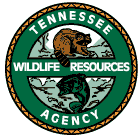 Nashville, TN – The Tennessee Wildlife Resources Agency has received a series of complaints recently from various recreational users concerning dredging activities on the Little River in Blount County.
Nashville, TN – The Tennessee Wildlife Resources Agency has received a series of complaints recently from various recreational users concerning dredging activities on the Little River in Blount County.
Complaints are centered on practices that include the use of suction dredges to excavate large holes in the river bottom, and the discharge of muddy water downstream from dredging activities. Also, there has been the blanketing of shoals with sediment, petroleum products on the water, and the use of high pressure hoses to blast holes in the river bank.
Upon investigation, the activities generating the complaints are related to gold mining.The Little River is extremely popular with visitors to the Great Smoky Mountains National Park and the Townsend area. Trout fishing, smallmouth bass fishing, tubing, canoeing, and wading are among the activities attracting both in-state and out-of-state visitors and local residents to the area.
Tennessee has a long tradition of people “panning for gold” using sieves, homemade sluice boxes, buckets and hand tools such as shovels and trowels. “Panning for gold” is considered by many to be an enjoyable family activity. Small scale panning using traditional techniques and hand tools does not pose a threat to Tennessee’s extraordinary aquatic resources.
As with all stream activities, TWRA recommends the respect for private property, following public lands rules, not littering, and being safe on the water.
The use of commercial grade suction dredges, large scale sluice systems, diesel-powered pumps, and mechanical shovels, including backhoes and track hoes, and the use of high pressure hoses to blast away riparian habitat in a method called “high bank mining,” has become an aquatic habitat destruction issue in several states. The use of commercial scale mining equipment by individuals is apparently being promoted by both equipment manufacturers and cable television programs about gold mining.
The destruction of aquatic habitat and related water pollution by suction dredging, use of backhoes or track hoes, or other machinery for gold mining in Tennessee streams and rivers is an illegal activity. The TWRA is responding to the complaints by contacting suction dredgers and high bank miners, obtaining contact and identification information, and taking such actions as are appropriate and provided for by state law.
The TWRA is aware of gold mining in the Coker Creek watershed in Polk County. The Coker Creek watershed is an issue that is currently under consideration by state and federal resource agencies.



Tennessee has a long tradition of people “panning for gold” using sieves, homemade sluice boxes, buckets and hand tools such as shovels and trowels.